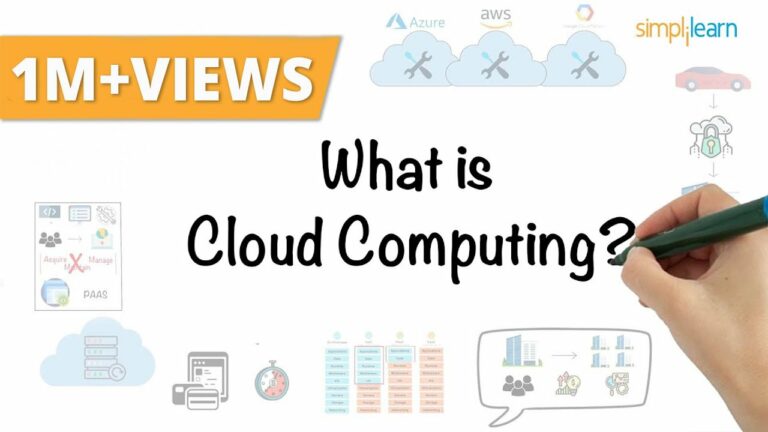Aws Vs Oracle Cloud
You’re a business owner who needs to decide which cloud solution to use for your company’s data management. You’ve heard about the two biggest players in the market: Amazon Web Services (AWS) and Oracle Cloud Infrastructure. Both have a wide range of cloud services to offer, but which one is the better fit for your business needs? The cloud computing market has seen significant growth in recent years, with more and more businesses shifting their data management to the cloud.
AWS, being the first to enter the cloud market, has held the largest market share for years. However, Oracle Cloud Infrastructure has been gaining momentum with its innovative and integrated cloud solutions. In this article, we’ll take an in-depth look at the strengths and weaknesses of AWS and Oracle Cloud Infrastructure, and help you decide which one is the best fit for your business.
Overview of the Cloud Computing Market
You’re about to learn all about the booming world of cloud computing and why it’s become a competitive market worth paying attention to. Cloud computing adoption has been growing rapidly in recent years, with more and more businesses and individuals relying on cloud-based services for data storage, processing, and management. The market for cloud computing services is expected to continue to grow at a steady pace as more companies shift to cloud-based operations. Market growth trends indicate that the cloud computing market is becoming increasingly competitive, with major players like Amazon Web Services (AWS) and Oracle vying for dominance.
AWS currently holds the largest share of the cloud computing market, with a 32% share in 2020, while Oracle is trailing behind with just 2.5%. However, Oracle has been ramping up its cloud offerings in recent years, with a focus on enterprise-level cloud solutions, and is poised to give AWS a run for its money. As the cloud computing market continues to expand, it’s important to keep an eye on the major players and their strategies. AWS has a significant head start in terms of market share, but Oracle’s focus on enterprise-level solutions could give them an edge in that particular market segment. As the competition heats up, it will be interesting to see how these two companies, and others, continue to innovate and differentiate themselves in the growing cloud computing market.
AWS Cloud Services
Starting with Elastic Compute Cloud (EC2), you can discuss how AWS provides scalable computing capacity in the cloud. This service allows you to launch virtual machines and configure them according to your needs. Moving on to Simple Storage Service (S3), you can talk about how AWS offers a highly durable and scalable object storage service. With S3, you can store and retrieve any amount of data from anywhere on the web. Finally, you can discuss Redshift, which is a fully managed data warehouse service that allows you to analyze large amounts of data using SQL and business intelligence tools. With Redshift, you can easily scale your data warehouse as your needs grow.
Elastic Compute Cloud (EC2)
EC2 is often hailed as the flagship service of the leading cloud provider, offering a wide range of instance types and pricing models for businesses of all sizes. One of the key advantages of EC2 is its cost-effectiveness, as it offers a pay-as-you-go pricing model that allows businesses to only pay for the resources they use. This makes it an attractive option for businesses that need to scale up or down their computing resources based on their needs.
In terms of performance, EC2 has consistently demonstrated its ability to deliver reliable and stable performance for a variety of workloads. AWS provides a number of tools and services that allow businesses to monitor and optimize their EC2 instances, ensuring that they are running at optimal levels. In addition, AWS offers a range of instance types, each with different performance characteristics, which allows businesses to choose the instance type that best meets their needs. Overall, EC2 remains a popular choice for businesses looking for a cost-effective and reliable cloud computing solution.
Simple Storage Service (S3)
If you’re looking for a simple and scalable storage solution for your business, S3 might just be the answer you’ve been searching for. Amazon Web Services (AWS) Simple Storage Service (S3) is one of the most popular cloud storage services on the market. It’s designed to be reliable, secure, and highly scalable, making it an ideal choice for businesses of all sizes.
Here are some key advantages of using AWS S3:
- Cost comparison: AWS S3 offers a cost-effective solution for storing and managing large amounts of data. You only pay for what you use, and there are no upfront costs or long-term commitments.
- Data security: AWS S3 is designed to be highly secure, with multiple layers of protection to keep your data safe. It uses industry-standard encryption protocols to protect your data both in transit and at rest. You can also set up access controls and permissions to ensure that only authorized users have access to your data.
Plus, with AWS’s pay-as-you-go model, you can easily scale your storage capacity up or down as needed, without worrying about overprovisioning or underprovisioning. Overall, AWS S3 is a reliable and scalable storage solution that offers cost-effective pricing and robust security features. If you’re looking for a simple and effective way to store and manage your data, AWS S3 is definitely worth considering.
Redshift
You may be interested in exploring Redshift, a cloud-based data warehousing solution that can help you efficiently manage and analyze large amounts of data. Redshift is a popular choice for businesses of all sizes due to its scalability, cost-effectiveness, and performance optimization features. With Redshift, you can store and analyze petabytes of data in a secure, highly available, and fault-tolerant environment. It is designed to provide fast query performance and support for complex analytical queries.
Redshift uses columnar storage, compression, and parallel processing to speed up data retrieval and analysis. Additionally, Redshift offers automatic workload management to optimize performance and reduce costs. You can easily scale your Redshift cluster up or down as needed, without any disruption to your data warehousing or analytical workflows. Overall, Redshift is an excellent choice for businesses that need to manage and analyze large amounts of data efficiently and cost-effectively.
Oracle Cloud Infrastructure Services
Check out the impressive range of services that Oracle Cloud Infrastructure has to offer, including computing, storage, networking, and more. Oracle Cloud Infrastructure Services is a reliable and secure cloud platform that offers a wide range of services. With its highly efficient and scalable infrastructure, Oracle’s cloud services enable businesses to run their applications faster, more securely, and at a lower cost. One of the most significant advantages of Oracle Cloud Infrastructure is its cloud security.
The platform comes with multiple layers of security, including network security, database security, and identity and access management. It also offers end-to-end encryption, data masking, and auditing features. Oracle Cloud Infrastructure Services is compliant with various security standards such as HIPAA, GDPR, SOC 1, SOC 2, and ISO 27001.
When it comes to pricing models, Oracle Cloud Infrastructure offers a pay-as-you-go model, which means you only pay for what you use. The pricing is transparent and easy to understand, with no hidden costs. Additionally, Oracle offers discounts for long-term commitments, and customers can choose from different pricing tiers to match their needs. Overall, Oracle Cloud Infrastructure Services is a cost-effective and reliable cloud platform that offers robust security features and a wide range of services.
Strengths and Weaknesses of AWS and Oracle Cloud Solutions
As you evaluate your options for cloud solutions, it’s important to consider the strengths and weaknesses of both AWS and Oracle to determine which one best fits your business needs. Here are some advantages and disadvantages of each solution to help you make an informed decision: AWS has a wider range of services and tools than Oracle, making it a better choice for businesses that require more advanced features and scalability. This also means that AWS has a larger user community and more third-party integrations, which can make it easier to find support and resources.
However, AWS can be more complex to set up and manage, which can be a disadvantage for smaller businesses with limited IT resources. Oracle Cloud, on the other hand, has a more streamlined and user-friendly interface, which can make it easier to learn and use. It also offers more predictable pricing models and better customer support, which can be an advantage for businesses that require high availability and reliability. However, Oracle Cloud has a more limited range of services and tools compared to AWS, which can make it less suitable for businesses with more complex needs.
Another factor to consider is security. Both AWS and Oracle Cloud offer high levels of security, but AWS has a stronger reputation for security and compliance, which can be an advantage for businesses that require strict data protection. However, Oracle Cloud has made significant investments in security and compliance in recent years, which has helped it gain more traction in regulated industries such as finance and healthcare. In summary, both AWS and Oracle Cloud have their own strengths and weaknesses, and the right choice depends on your specific business needs and priorities. Consider factors such as scalability, complexity, user-friendliness, pricing, customer support, and security when evaluating your options.
AWS vs Oracle: Which is the Better Cloud Solution?
When considering which cloud solution to choose between AWS and Oracle, there are several factors to take into account. These include pricing, scalability, security, and the specific needs of your business. Looking towards the future, AWS currently holds the majority of the market share in the cloud computing industry, but Oracle is making efforts to catch up and innovate with its cloud offerings. Ultimately, the decision between AWS and Oracle will depend on your individual business needs and priorities, but it’s important to thoroughly research and compare both options before making a decision.
Factors to Consider in Choosing a Cloud Solution
When it comes to choosing the right cloud solution for your business, there are several important factors you should consider to ensure you make the best decision for your unique needs. Cost-effectiveness is a critical consideration, as cloud services come with different pricing models. You should look for a solution that offers flexible pricing options that align with your budget and usage requirements. AWS and Oracle offer competitive pricing models, and you should compare their pricing structures to determine which one meets your needs. Scalability and flexibility are also vital factors to consider when choosing a cloud solution.
You should look for a solution that can grow with your business and accommodate changing needs over time. AWS and Oracle both offer scalable and flexible cloud services, but the degree of scalability and flexibility varies. You should assess your needs and compare the offerings of both solutions to determine which one aligns with your business requirements. By taking the time to evaluate your needs based on these critical factors, you can choose a cloud solution that meets your business needs and helps you stay ahead of the competition.
Future Outlook for AWS and Oracle in the Cloud Computing Market
Now that you’ve considered the factors to keep in mind when choosing a cloud solution, it’s time to look into the future of the two major players in the cloud computing market – AWS and Oracle. While both companies have a significant foothold in the industry, their market share predictions vary greatly. AWS is currently the leader in the cloud computing market, with a 32% market share. In contrast, Oracle has only 2.5% of the market share. However, Oracle has been making strides to increase its market share by expanding its offerings and partnerships. It remains to be seen if they can catch up to AWS.
Emerging technologies such as artificial intelligence (AI) and machine learning (ML) are also expected to have a significant impact on the cloud computing market. AWS has already established itself as a leader in AI and ML services, offering a range of tools and services to help businesses leverage these technologies. Oracle, on the other hand, has been investing heavily in AI and ML and is expected to make significant strides in this area in the coming years. As more businesses begin to adopt AI and ML, it will be interesting to see how AWS and Oracle compete in this space.
FAQs
What are the pricing options available for AWS and Oracle Cloud solutions?
When selecting the right cloud solution for your business needs, cost comparison is an important factor to consider. AWS and Oracle both offer pricing options for their cloud solutions that aim to fit different business budgets. AWS has a pay-as-you-go model that allows users to only pay for the services they use, while Oracle offers a similar model but with a minimum monthly commitment. AWS also has a reserved instance option that provides discounts for customers who commit to using a certain amount of resources for a certain period of time, while Oracle has a Universal Credit model that offers flexible pricing options. Ultimately, the cost comparison between AWS and Oracle will depend on your specific business needs and usage patterns.
How do AWS and Oracle Cloud solutions differ in terms of security and compliance?
When it comes to cloud security and compliance, AWS and Oracle Cloud Solutions have some significant differences. While both providers offer robust security features, AWS has a more extensive set of security tools and certifications, making it a great choice for companies with strict security and compliance needs. However, Oracle Cloud Solutions offers a unique approach to security, with its Autonomous Database and Cloud Access Security Broker (CASB) features.
These tools allow for more granular control over data access and usage, making it an excellent choice for companies with complex data protection needs. Despite the differences, both AWS and Oracle Cloud Solutions are top contenders in the cloud security and compliance comparison game, and ultimately, the choice will depend on your specific business needs.
Can AWS and Oracle Cloud solutions be integrated with other cloud platforms?
If you’re considering a multi-cloud strategy or a hybrid cloud implementation, you may be wondering if AWS and Oracle cloud solutions can be integrated with other cloud platforms.
The answer is yes. Both AWS and Oracle offer a wide range of tools and services that enable interoperability and integration with other cloud platforms. AWS provides several services such as AWS Direct Connect, AWS Transit Gateway, and AWS PrivateLink that make it easy to integrate with other cloud providers.
On the other hand, Oracle offers the Oracle Cloud Infrastructure FastConnect service, which allows customers to create a private connection between their on-premises infrastructure and Oracle Cloud. Additionally, Oracle Cloud provides native integration with other cloud providers such as Microsoft Azure and Google Cloud Platform. Ultimately, the decision to integrate multiple cloud platforms depends on your specific business needs and objectives.
What are the customer support options for AWS and Oracle Cloud solutions?
When it comes to customer support, both AWS and Oracle Cloud Solutions offer 24/7 availability. However, there is a difference in response time between the two. AWS has a reputation for providing quick response times, with an average of less than 15 minutes for critical issues. On the other hand, Oracle Cloud Solutions’ response times can vary depending on the severity of the issue. For critical issues, Oracle guarantees a response time of 15 minutes, but for non-critical issues, the response time can be up to 2 hours. Overall, both AWS and Oracle Cloud Solutions offer reliable customer support, but if quick response times are a priority for you, AWS may be the better option.
How do AWS and Oracle Cloud solutions handle data migration and storage?
When it comes to cloud migration strategies and data storage solutions, both AWS and Oracle Cloud Solutions offer a range of options. AWS provides a variety of tools and services for data migration, including AWS Database Migration Service, AWS Snowball, and AWS Storage Gateway. These tools allow for seamless and secure transfer of data to the cloud.
On the other hand, Oracle Cloud Solutions offers a comprehensive data migration strategy that includes a mix of automated and manual migration options. Additionally, Oracle’s data storage solutions include Object Storage, Block Volumes, and File Storage, providing scalable and flexible storage options for businesses of all sizes. Overall, both AWS and Oracle Cloud Solutions offer robust cloud migration and storage solutions, and businesses should carefully evaluate their specific needs before choosing one over the other.
In conclusion, choosing between AWS and Oracle for your cloud solution will depend on your specific needs and priorities. AWS offers a wide range of services and has a proven track record in the cloud computing market, making it a safe bet for many businesses. However, Oracle’s focus on security and its ability to seamlessly integrate with its existing software may make it a more attractive option for some.
To put it in perspective, choosing between AWS and Oracle is like choosing between a Swiss Army Knife and a Leatherman. Both are versatile and reliable tools, but one may be better suited for certain tasks than the other. Ultimately, the decision comes down to your individual needs and preferences. Overall, the cloud computing market is constantly evolving and changing, with new players entering the game and existing players expanding their offerings. As such, it’s important to carefully evaluate your options and choose a cloud solution that will best support your business goals and objectives.







